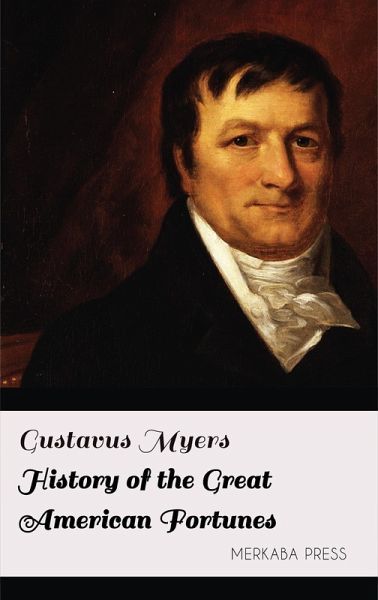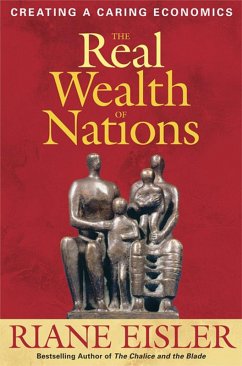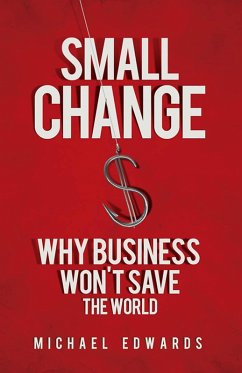
History of the Great American Fortunes (eBook, ePUB)

PAYBACK Punkte
0 °P sammeln!
The noted private fortunes of settlement and colonial times were derived from the ownership of land and the gains of trading. Usually both had a combined influence and were frequently attended by agriculture. Throughout the colonies were scattered lords of the soil who held vast territorial domains over which they exercised an arbitrary and, in some portions of the colonies, a feudal sway. Nearly all the colonies were settled by chartered companies, organized for purely commercial purposes and the success of which largely depend...
The noted private fortunes of settlement and colonial times were derived from the ownership of land and the gains of trading. Usually both had a combined influence and were frequently attended by agriculture. Throughout the colonies were scattered lords of the soil who held vast territorial domains over which they exercised an arbitrary and, in some portions of the colonies, a feudal sway.
Nearly all the colonies were settled by chartered companies, organized for purely commercial purposes and the success of which largely depended upon the emigration which they were able to promote. These corporations were vested with enormous powers and privileges which, in effect, constituted them as sovereign rulers, although their charters were subject to revision or amendment. The London Company, thrice chartered to take over to itself the land and resources of Virginia and populate its zone of rule, was endowed with sweeping rights and privileges which made it an absolute monopoly. The impecunious noblemen or gentlemen who transported themselves to Virginia to recoup their dissipated fortunes or seek adventure, encountered no trouble in getting large grants of land especially when after 1614 tobacco became a fashionable article in England and took rank as a valuable commercial commodity.
Over this colony now spread planters who hastened to avail themselves of this new-found means of getting rich. Land and climate alike favored them, but they were confronted with a scarcity of labor. The emergency was promptly met by the buying of white servants in England to be resold in Virginia to the highest bidder. This, however, was not sufficient, and complaints poured over to the English government. As the demands of commerce had to be sustained at any price, a system was at once put into operation of gathering in as many of the poorer English class as could be impressed upon some pretext, and shipping them over to be held as bonded laborers. Penniless and lowly Englishmen, arrested and convicted for any one of the multitude of offenses then provided for severely in law, were transported as criminals or sold into the colonies as slaves for a term of years. The English courts were busy grinding out human material for the Virginia plantations; and, as the objects of commerce were considered paramount, this process of disposing of what was regarded as the scum element was adjudged necessary and justifiable. No voice was raised in protest.
Nearly all the colonies were settled by chartered companies, organized for purely commercial purposes and the success of which largely depended upon the emigration which they were able to promote. These corporations were vested with enormous powers and privileges which, in effect, constituted them as sovereign rulers, although their charters were subject to revision or amendment. The London Company, thrice chartered to take over to itself the land and resources of Virginia and populate its zone of rule, was endowed with sweeping rights and privileges which made it an absolute monopoly. The impecunious noblemen or gentlemen who transported themselves to Virginia to recoup their dissipated fortunes or seek adventure, encountered no trouble in getting large grants of land especially when after 1614 tobacco became a fashionable article in England and took rank as a valuable commercial commodity.
Over this colony now spread planters who hastened to avail themselves of this new-found means of getting rich. Land and climate alike favored them, but they were confronted with a scarcity of labor. The emergency was promptly met by the buying of white servants in England to be resold in Virginia to the highest bidder. This, however, was not sufficient, and complaints poured over to the English government. As the demands of commerce had to be sustained at any price, a system was at once put into operation of gathering in as many of the poorer English class as could be impressed upon some pretext, and shipping them over to be held as bonded laborers. Penniless and lowly Englishmen, arrested and convicted for any one of the multitude of offenses then provided for severely in law, were transported as criminals or sold into the colonies as slaves for a term of years. The English courts were busy grinding out human material for the Virginia plantations; and, as the objects of commerce were considered paramount, this process of disposing of what was regarded as the scum element was adjudged necessary and justifiable. No voice was raised in protest.
Dieser Download kann aus rechtlichen Gründen nur mit Rechnungsadresse in A, B, BG, CY, CZ, D, DK, EW, E, FIN, F, GR, H, IRL, I, LT, L, LR, M, NL, PL, P, R, S, SLO, SK ausgeliefert werden.













